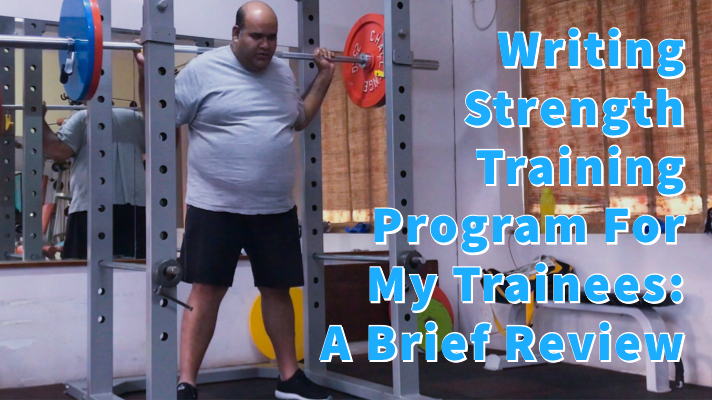In the attached video, you can watch my trainee/client Ameet lifting 110 kilograms for 5 repetitions. He has accomplished this objective over a period of 6 months. You wouldn’t predict this outcome if you watched his first session: fitness assessment day.
On the first day of his fitness evaluation, he could barely squat. The depth of his squat was less than a quarter. This was an assessment of his strength: he couldn’t move his own bodyweight through the crucial range of motion. Every individual needs to understand that the knee-joints are supposed to go through an effective range of motion for them to maintain optimal joint-strength.
This is why writing a strength-training program is extraordinarily interesting. Here is an individual who cannot squat his own body weight, and as a coach, I have the responsibility to write a program that must guide him to lift 100 kilograms (plus his own bodyweight) and at the same time make sure he doesn’t get injured in the process. If that isn’t extraordinarily interesting than I don’t know what is. And that’s not all. I must also communicate to him the complexities of the program in an intelligible manner and provide evidence to support the training program. What would you do if you were him? Would you be convinced about lifting 100 kilograms when you barely squat your own bodyweight? These questions are for the women as well.
I should also make it clear that I write strength training programs not only to improve the strength of my trainees but to make optimal use of the strength training method to address other attributes of health such as blood pressure, blood glucose, etc. Ameet and I did the same with his strength-training program. We have addressed his overall health and are greatly satisfied with the ongoing progress such as the before and after blood profile: crucial markers of his health.
As far as I understand, an effective strength training program prioritizes the musculoskeletal capacity and its limitations, and the manner in which it functions and interacts with other organ systems: physiology. I’d advise you to make some time to read the article Lifting heavy weights isn’t only about displaying one’s strength. It is the reflection of one’s physiological adaptation. This article will give you an understanding of how intelligently written strength-training programs can help you to address other attributes of your health.
I also have an approach of conducting our training sessions as an ongoing laboratory experiment; the objective being program refinement. However, it’s not a randomly written program in a coffee shop for a social media post. If you know what I mean! This is a program scientifically written for one specific individual after evaluating his/her specific abilities and limitations while simultaneously investigating the potential benefits and potential risks.
Executing the program under controlled conditions gives me an opportunity to observe my trainee’s/client’s response to a given intensity/load/weight or a lifting technique. It’s also an opportunity for my trainee/client to give me feedback of their perception of the intensity/load/weight or a lifting technique. Together, at every session, my observations and my trainee’s feedback help me take crucial actions to refine the program before the next training session. And the process continues. This results in gathering extensive training data of my trainee/client. And this extensive data helps make spontaneous predictions in the future more precise.
This process of using objective evidence in writing the program and subsequently refining the program is my understanding of the science of programming strength training. I certainly know that this isn’t everything there is to programming. I will have more to add to this process as I keep unearthing new facets. I’m on a mission to refine barbell lifts program and guide those who are interested in such a scientific approach.
Hope this article brings value to your training program. Those who think this article may help somebody you know, please share it with them. If you’re serious about your training-time and effort, make sure you follow the scientific process of strength training. And if you’ve never pursued strength training, I’d suggest you give it a try; you will be exhilarated by your strength potential. If you have any questions or feedback please leave it in the comments section. Thank you for reading.
Stay Strong, Stay Healthy!
